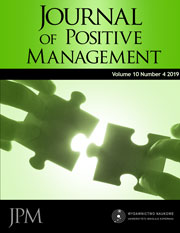LEADERSHIP, SERVANT LEADERSHIP AND FUNDAMENTAL STATE OF LEADERSHIP AND COMPONENTS OF FOLLOWERS’ PSYCHOLOGICAL WELL-BEING
DOI:
https://doi.org/10.12775/JPM.2019.016Abstract
Purpose
The purpose of the paper is to propose the framework of effects of various aspects of positive leadership on components of long-term well-being.
Methodology/approach
The paper is conceptual in nature. I use the established frameworks considered as related to positive leadership and assess the effect of each of their dimensions on components of followers’ psychological well-being.
Findings
There are complex relationships between aspects of positive leadership: transformational leadership, authentic leadership, servant leadership and fundamental state of leadership and components of followers’ psychological well-being (self-acceptance, autonomy, positive relationships with others, environmental mastery, purpose in life, personal growth). For instance intellectual stimulation, conceptual skills, helping subordinates grow and results orientation of the leader contribute to personal growth of the follower.
Implications/limitations either for further research, for practice, or for society
The study brings some practical recommendations for leaders on how to support psychological well-being of the followers. It is critical that leaders recognize strong and weak components of well-being of their followers and support them. This, in turn, will have positive effect on employee’s performance according to happy-productive principle.
Originality/value of the paper
The paper contributes to the literature in leadership and well-being in a couple of ways. It contributes to the growing literature of positive leadership by considering previously ignored effect of long-term well-being of followers, it contributes more generally to the literature of leadership by showing the possible advantage of positive style of leadership, and adds to the discussion on well-being by suggesting how it might contribute from certain behaviors of the leader.
Downloads
Published
How to Cite
Issue
Section
License
Copyright
Articles submitted to the journal should not have been published before in their current or substantially similar form, or be under consideration for publication with another journal. Authors submitting articles for publication warrant that the work is not an infringement of any existing copyright and will indemnify the publisher against any breach of such warranty. For ease of dissemination and to ensure proper policing of use, papers and contributions become the legal copyright of the publisher unless otherwise agreed.
Plagiarism and ghostwriting
In response to the issue of plagiarism and ghostwriting the editors of the Journal of Positive Management has introduced the following rules to counteract these phenomena:
1. Contributors should be aware of their responsibility for a content of manuscripts.
2. Collective authors are obliged to reveal the contribution and an affiliation of each author (i.e. who is an author of specified part of a paper).
3. Any act of dishonesty will be denounced, the editors will inform appropriate institutions about the situation and give evidence of all cases of misconduct and unethical behaviour.
4. The editors may ask contributors for financial disclosure (i.e. contribution of specified institutions).
Stats
Number of views and downloads: 938
Number of citations: 0



